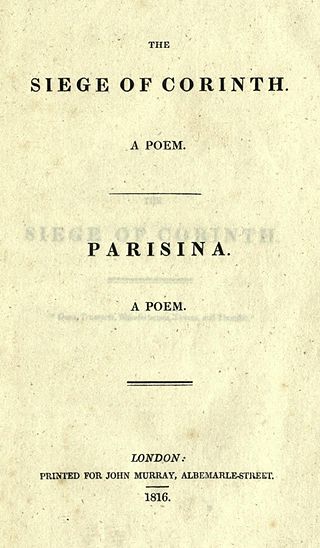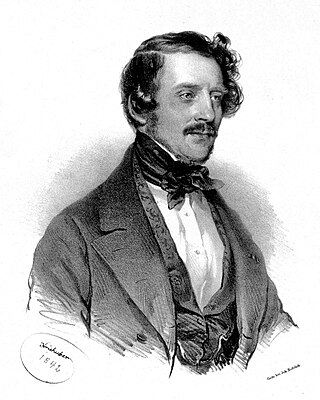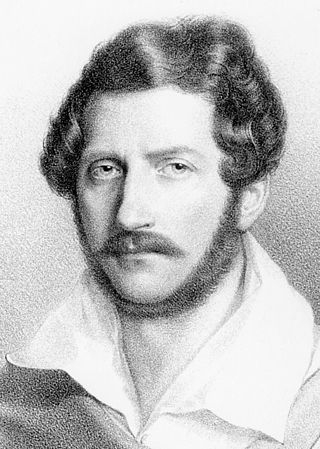
Don Pasquale is a Gaetano Donizetti opera buffa, or comic opera, in three acts, with an Italian libretto completed largely by Giovanni Ruffini as well as the composer. It was based on a libretto by Angelo Anelli for Stefano Pavesi's opera Ser Marcantonio written in 1810 but, on the published libretto, the author appears as "M.A."

Lucrezia Borgia is a melodramatic opera in a prologue and two acts by Gaetano Donizetti. Felice Romani wrote the Italian libretto after the play Lucrezia Borgia by Victor Hugo, in its turn after the legend of Lucrezia Borgia. Lucrezia Borgia was first performed on 26 December 1833 at La Scala, Milan.

La favorite is a grand opera in four acts by Gaetano Donizetti to a French-language libretto by Alphonse Royer and Gustave Vaëz, based on the play Le comte de Comminges by Baculard d'Arnaud with additions by Eugène Scribe based on the story of Leonora de Guzman. The opera concerns the romantic struggles of the King of Castile, Alfonso XI, and his mistress, the "favourite" Leonora, against the backdrop of the political wiles of receding Moorish Spain and the life of the Catholic Church. It premiered on 2 December 1840 at the Académie Royale de Musique in Paris.

Parisina is a 586-line poem written by Lord Byron. It was probably written between 1812 and 1815, and published on 13 February 1816.

Caterina Cornaro ossia La Regina di Cipro is a tragedia lirica, or opera, in a prologue and two acts by Gaetano Donizetti. Giacomo Sacchero wrote the Italian libretto after Jules-Henri Vernoy de Saint-Georges' libretto for Halévy's La reine de Chypre (1841). It is based on the life of Caterina Cornaro, Queen of Cyprus from 1474 to 1489. It premiered at the Teatro San Carlo, Naples on 12 January 1844.

Marino Faliero is a tragedia lirica, or tragic opera, in three acts by Gaetano Donizetti. Giovanni Emanuele Bidera wrote the Italian libretto, with revisions by Agostino Ruffini, after Casimir Delavigne's play. It is inspired by Lord Byron's drama Marino Faliero (1820) and based on the life of Marino Faliero (c.1285-1355), the Venetian Doge.

Maria Padilla is a melodramma, or opera, in three acts by Gaetano Donizetti. Gaetano Rossi and the composer wrote the Italian libretto after François Ancelot's play. It premiered on 26 December 1841 at La Scala, Milan. The plot is loosely based on the historical figure María de Padilla, the mistress of Pedro the Cruel, King of Castile.

Il castello di Kenilworth is a melodramma serio or tragic opera in three acts by Gaetano Donizetti. Andrea Leone Tottola wrote the Italian libretto after Victor Hugo's play Amy Robsart (1828) and Eugène Scribe's play Leicester, both of which following from Sir Walter Scott's novel Kenilworth (1821). Daniel Auber composed another opera on the same subject, Leicester, ou Le chateau de Kenilworth in 1823.

Imelda de' Lambertazzi is a melodramma tragico or tragic opera in two acts by Gaetano Donizetti from a libretto by Andrea Leone Tottola, based on the tragedy Imelda by Gabriele Sperduti. It received its first performance on 5 September 1830 at the Teatro San Carlo, Naples.

Gianni di Parigi is an 1839 melodramma comico in two acts with music by Gaetano Donizetti to a libretto by Felice Romani, which had previously been set by Francesco Morlacchi in 1818 and by Giovanni Antonio Speranza in 1836.

Antonio Tamburini was an Italian operatic baritone.

Enrico di Borgogna is an opera eroica or "heroic" opera in two acts by Gaetano Donizetti. Bartolomeo Merelli, wrote the Italian libretto based on Der Graf von Burgund by August von Kotzebue.

Niccolò III d'Este was Marquess of Ferrara from 1393 until his death. He was also a condottiero.

Le duc d'Albe or Il duca d'Alba is an opera in three acts originally composed by Gaetano Donizetti in 1839 to a French language libretto by Eugène Scribe and Charles Duveyrier. Its title, which translates as The Duke of Alba, refers to its protagonist Fernando Álvarez de Toledo, 3rd Duke of Alba. The work was intended for performance at the Paris Opéra. However, William Ashbrook notes that "Rosine Stoltz, the director's mistress, disliked her intended role of Hélène and Donizetti put the work aside when it was half completed".
Dano Raffanti is an Italian tenor, particularly associated with the Italian baroque and bel canto repertory.

Sancia di Castiglia is an Italian opera seria in two acts by Gaetano Donizetti to a libretto by Pietro Salatino. It was first performed at the Teatro San Carlo in Naples on 4 November 1832, conducted by Nicola Festa.

Adelia, o La figlia dell'arciere is an opera in three acts by Gaetano Donizetti. The Italian libretto was written partly by Felice Romani and by Girolamo Maria Marini, a part-time poet who had achieved notability the previous year with Otto Nicolai's Il templario. The opera premiered at the Teatro Apollo, Rome on 11 February 1841.

Una follia is a farsa in one act by composer Gaetano Donizetti. The work premiered on 15 December 1818 at the Teatro San Luca in Venice. The opera uses the same Italian-language libretto by Bartolomeo Merelli after August von Kotzebue's Der Graf von Burgund that Donizetti used for his Enrico di Borgogna a month earlier, but with different music. It was given one performance and "never performed again, and its score has never been found."

Laura Malatesta, better known as Parisina Malatesta, was an Italian marchioness. She was the daughter of Andrea Malatesta, lord of Cesena, and his second wife, Lucrezia Ordelaffi. She had an affair with her illegitimate stepson, Ugo d'Este, and both were beheaded by her husband, Marquis Niccolò III d'Este of Ferrara.
Parisina Malatesta was the wife of Niccolò III d'Este, who beheaded her with her lover and stepson Ugo d'Este. Her tragic story has inspired writers and musicians:














